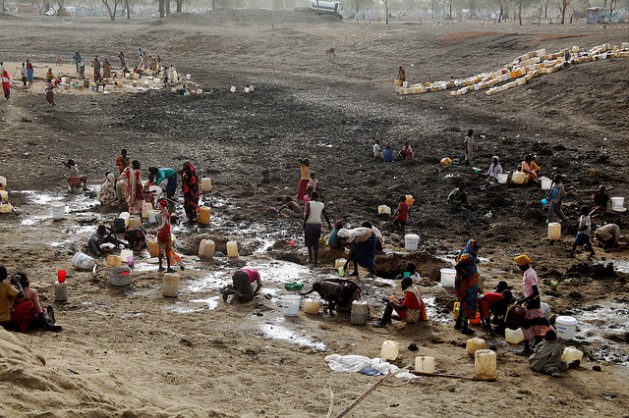
HIGHEST NUMBER OF REFUGEES IN TWO DECADES
Fabiola Ortiz

Refugees dig for water in a dried up watering hole in Jamam camp, in South Sudan's Upper Nile state. Credit: Jared Ferrie/IPS
- Yves Norodom, a 21-year-old refugee from the Democratic Republic of Congo living in Brazil, is one of 45.2 million displaced people around the world – the largest number in 20 years.
In its annual report Global Trends 2012: Displacement, the New 21st Century Challenge, released Wednesday, the UNHCR said 28.8 million of that total were internally displaced persons (IDPs), 15.4 million were refugees outside their own countries, and nearly one million were asylum-seekers.
Some 35.8 million people were under the UNHCR mandate by late 2012 – the second highest number on record.
On average, 23,000 people were forced to flee their homes every day in 2012.
Norodom told IPS that he fled his country, the DRC, for Kenya, and from there to the United Kingdom, before finally making his way to Brazil in 2010 without documents or belongings.
“In Congo, everyone feared for their lives,” he said. “I was struggling to survive, I did the impossible to make it. My job was to save my own skin, and I was 17 years old at the time.”
His father, a member of the opposition, had to flee the DRC nearly a decade ago, and Norodom’s 15 siblings gradually found refuge in other countries, until the family ended up spread out across the globe.
“They threatened us, and six of us landed in Brazil. Others had already found refuge, some in Africa, others in France. We had to split up,” he lamented.
One of Norodom’s biggest challenges has been learning Portuguese. “I had never heard the language before. It took me six months to learn the basics, and a year to speak it a little better.”
He is currently unemployed, but he dreams of one day returning to school and attending the public university in Rio de Janeiro to study chemical engineering.
“I wouldn’t say I’m very happy, but at least I’m alive and I’m ok,” he said.
Norodom is one of 4,715 refugees of 76 nationalities in Brazil, according to figures from CONARE, the government’s national refugee agency. Of that total, 2,012 receive assistance from the UNHCR.
“They are people who belong to ethnic groups fleeing for reasons of thought or conflicts. Our challenge is to offer the refugees better conditions to adapt and integrate,” said CONARE vice-president João Guilherme Granja.
Brazil has adequate laws on refugees and offers them the same public services that are enjoyed by the country’s citizens. But this country of 198 million people receives a far smaller number of refugees than much poorer countries like Pakistan, which currently hosts over 1.6 million refugees.
At the launch of the Global Trends report ahead of World Refugee Day (Jun. 20), UNHCR representative in Brazil Andrés Ramírez said armed conflict was still the main cause of forced displacement.
He said more than half of the world’s refugees came from five countries: Afghanistan, Iraq, Somalia, Sudan and Syria.
On average, war and other crises drove one person from their home every 4.1 seconds, last year, Ramírez said. “The political will to prevent conflicts has been lacking at a global level,” he added. “The refugee issue is a human tragedy of enormous magnitude.”
As it has for the past three decades, Afghanistan headed the list, accounting for one of every four of the 10.5 million refugees under the UNHCR mandate, or 2.5 million. It was followed by Somalia (1.1 million), Iraq (746,700), and Syria (471,400).
The report says about four-fifths of the world’s refugees flee to neighbouring countries.
The list of countries hosting the largest refugee populations includes Pakistan, the DRC, Kenya, Iran, Syria and Kenya.
In 2012, Brazil received over 1,200 requests for asylum, and the number will be bigger this year, Ramírez said.
“We have more requests now because of the crises around the world,” the UNCHR representative said. “Brazil is a country of continental dimensions and could receive more refugees, but it is far away from the places where the humanitarian crises are occurring.”
The rise in the cost of living in Brazil’s cities and the day-to-day difficulties in making a living faced by a large part of the population also affect the quality of life of refugees, said Aline Thuller, with the Catholic NGO Caritas.
“A majority of the refugees live in favelas (shantytowns) and other poor neighbourhoods. They have the same rights to public services and face the same difficulties as Brazilians. Most of them work in the informal sector,” she told IPS.
“There is still a lot of prejudice” against refugees, Thuller said.
In the past, the refugees assisted by Caritas were mainly Angolan men, who were fleeing forced recruitment during the 27-year civil war in that former Portuguese colony in southern Africa.
But today, many pregnant women and entire families reach Rio de Janeiro as refugees.
The state of Rio de Janeiro, which receives the second-largest number of refugees after São Paulo, is in the final stages of designing a state-wide refugee policy.
Under the new policy, “working groups will be created by thematic area and will organise practical activities, to facilitate refugees’ access to basic rights,” Thuller said.
http://www.ipsnews.net/2013/06/highest-number-of-refugees-in-two-decades/
